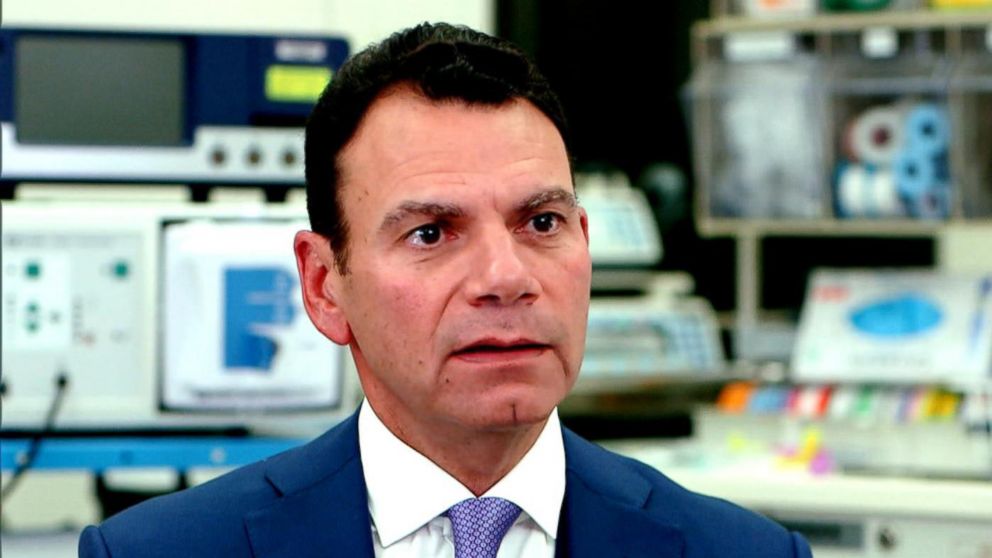
Transcript for Surgeon meets potential face transplant recipient before agreeing to operate: Part 3
Reporter: Long before Dr. Eduardo Rodriguez took over the renowned plastic surgery program at nyu Langone medical center in New York, when he was just a student, he went to see a movie. Watching John travolta trade his face for Nicholas cage’s in the 1997 sci-fi crime drama “Face off.” So you want to take his face and mine — Borrow. Reporter: Rodriguez had no idea he was seeing a kind of preview of his own career. As a matter of fact I thought, “That’s impossible.” No one thinks of that movie as real or even happening in the near future. I never thought about that. Reporter: If face transplants were long shots back then, you might say Rodriguez was too. In fact, when he first applied to medical school from his hometown of Miami he didn’t get in. I was not gonna give up. I had to do something to take care of patients. Reporter: So he initially went to dental school and eventually landed at the prestigious Johns Hopkins in Baltimore. In an amazing coincidence, Dr. Rodriguez just happened to be there in 2000, as ABC news cameras captured a remarkable moment, a plastic surgery resident quitting on camera. Her colleagues are stunned to learn that she is resigning as a doctor at Hopkins. And I interviewed for that position and I got it. Reporter: As he progressed in the field, learning skills to reshape bodies, he started seeing soldiers returning home from combat in Afghanistan and Iraq with horrific facial injuries, far beyond what plastic surgery could fix. Imagine looking in the mirror every day without a Normal face. It doesn’t look like you. No, it’s a complete identity crisis. But the face is the only part of the body you cannot conceal. You can’t hide it. It’s such an important part of our body. What defines us, what people see for the first time. Without a Normal face, it’s not living. Reporter: In 2012, Dr. Rodriguez did his first face transplant in Maryland. Then he moved on to nyu, where he did his second in 2015. The one on the Mississippi firefighter, the same one on “Nightline” that cam’s mom Bev now knew about. Cam’s mom sent me an email. Her story was very moving. Bev sent you photographs from California. Yes. Of cam. What did you see in those photos? Right away, when I saw the image, I knew that that injury there was no way I could ever make him Normal with conventional surgery. Reporter: At least on paper, cam was a potential candidate to become Dr. Rodriguez’s third transplant patient. How do you pick then who is a candidate for a face transplant and who isn’t? That’s a very difficult question. Reporter: A question, made more difficult when you consider that the procedure costs over a million dollars. The hard question for everyone, was cam worth it? How worried were you that he might try this again, that he might try to end his life again? Everybody was very worried about that. Reporter: So next a 3,000-mile scouting trip of sorts to yuba city, California to meet cam and his family face-to-face. The fact that he actually had suicidal ideation, on which he tried to deliver on, act on is still a concern and something we have to talk about. I don’t think that anybody knew that it was a test per se. I think we did understand that he had to be sure that their investment in Cameron was secure and that he was not the kind of patient that would take this amazing miraculous gift and throw it away. This is only something we offer to select individuals. You used to race? I need to know that I have a fighter in my hands. You ever get this out to ride? Yeah, I rode it last week. Did you? Yeah. And this person’s willing to do whatever it takes to have this operation be successful. We should never give up on these individuals that go through this incident in their life. What was it about the drinking that made you feel that way? I really hated it that I was drinking so much. I don’t need it anymore like I felt I did before. I think it’s very important that people understand the severity of undergoing this operation. It’s not a quick fix. No, not at all. Reporter: For starters, a face transplant means a lifetime of treatments with harsh side effects to prevent rejection. And doctors say they just don’t know enough yet to predict survival beyond ten years. Maybe we can only promise him ten years of life. As a mom, though, did that give you pause? It did, but this was cam’s decision to be made too. Is that your truck, cam? That’s his truck. Reporter: By the end of the visit, both doctor and patient were on board. Being accepted into this program is very much like winning the lottery. But instead of winning $500 million, Cameron wins a second chance at life. We had hope for the first time. And that’s something when you felt hopeless up until that point. As a mom, you want to fix things. Reporter: But fixing things now would require one more huge step. How difficult is it to find a donor? The donor is the most difficult part of this. It’s like a needle in a
This transcript has been automatically generated and may not be 100% accurate.





